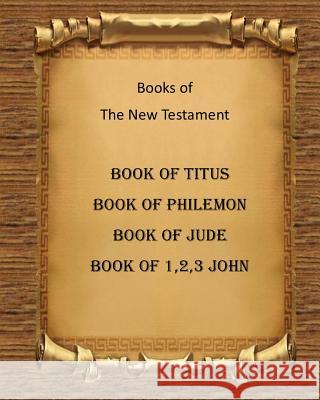Book of Titus, Book of Philemon, 3 Letters of John and Book of Jude » książka
Book of Titus, Book of Philemon, 3 Letters of John and Book of Jude
ISBN-13: 9781519181435 / Angielski / Miękka / 2015 / 38 str.
The Epistle of Paul to Titus, usually referred to simply as Titus, is one of the three Pastoral Epistles (along with 1 Timothy and 2 Timothy) traditionally attributed to Paul the Apostle and is part of the New Testament. It is addressed to Titus and describes the requirements and duties of elders and bishops. Like 2 Timothy, this epistle is considered to be Paul's final instructions to early church leaders before his final departure. The Epistle of Paul to Philemon, known simply as Philemon, is one of the books of the Christian New Testament. It is a prison letter, co-authored by Paul the Apostle with Timothy, to Philemon, a leader in the Colossian church. It deals with the themes of forgiveness and reconciliation. Paul does not identify himself as an apostle with authority, but as "a prisoner of Jesus Christ," calling Timothy "our brother," and addressing Philemon as "fellowlabourer" and "brother." 1] Onesimus, a slave that had departed from his master Philemon, was returning with this epistle wherein Paul asked Philemon to receive him as a "brother beloved." 2] Philemon was a wealthy Christian, possibly a bishop 3] of the house church that met in his home (Philemon 1:1-2) in Colosse. This letter is now generally regarded as one of the undisputed works of Paul. It is the shortest of Paul's extant letters, consisting of only 445 words and 25 verses in the Bible. 4] John the Apostle was one of the Twelve Apostles of Jesus according to the New Testament. He was the son of Zebedee and Salome. His brother was James, who was another of the Twelve Apostles. Christian tradition holds that he outlived the remaining apostles and that he was the only one not to die a martyr's death. The Church Fathers consider him the same person as John the Evangelist, John of Patmos, and the Beloved Disciple. The tradition of many Christian denominations holds that he is the author of several books of the New Testament. Jude urges his readers to defend the deposit of Christ's doctrine that had been closed by the time he wrote his epistle, and to remember the words of the apostles spoken somewhat before. He uses language similar to the second epistle of Peter to answer concerns that the Lord seemed to tarry, How that they told you there should be mockers in the last time, who should walk after their own ungodly lusts... Jude then asks the reader to recall how even after the Lord saved his people out of the land of Egypt, he did not hesitate to destroy those who fell into unbelief, much as he punished the angels who fell from their original exalted status.
Zawartość książki może nie spełniać oczekiwań – reklamacje nie obejmują treści, która mogła nie być redakcyjnie ani merytorycznie opracowana.











